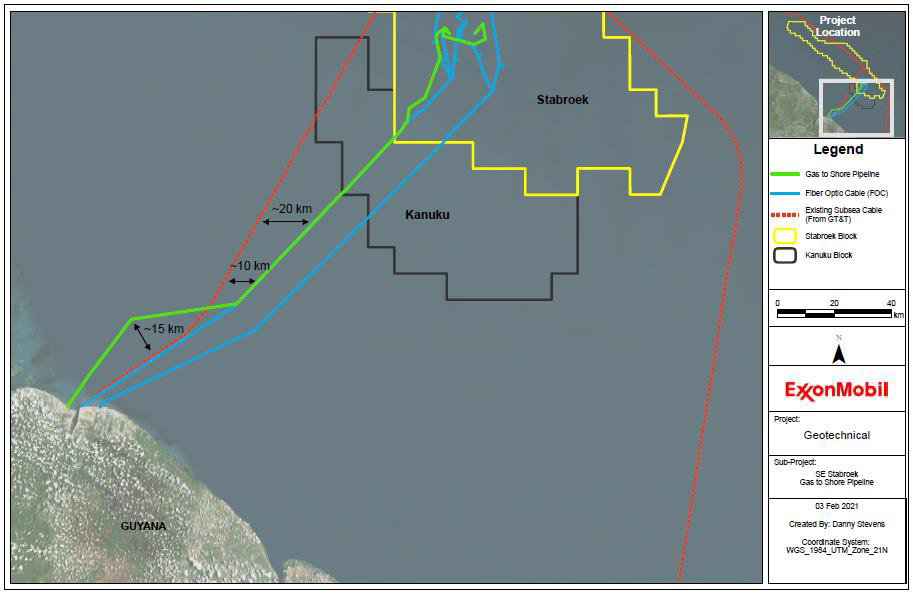A court ruling against the government over several plots of land at Wales, West Bank Demerara could complicate plans for the proposed US$900 million gas-to-shore project.
Acting Chief Justice Roxane George-Wiltshire, SC, recently ruled that government holding company NICIL unlawfully terminated a number of agreements regarding the lease of former sugar estate lands, which are in the path of the proposed terrestrial pipeline.
“There are areas at Wales, leased by NICIL…that would fall into the path of the project. With the Chief Justice’s ruling and possibility for appeal and the time that takes, it could and could not impact the project. How government works around that is left to be decided,” a source told Sunday Stabroek.
The National Industrial and Commercial Investments Limited (NICIL) has said that it plans to appeal the ruling. “Yes, NICIL plans to appeal the ruling,” NICIL’s attorney, Devindra Kissoon, told Sunday Stabroek on Friday when contacted.
Sources say that access to the lands could pose a problem because of the impact that the time those legal actions could take could have on the 2024 estimated deadline for completion of the project.
If the Appeal Court also upholds the Chief Justice’s ruling and the matter is taken to the Caribbean Court of Justice, it could see the project timelines being further pushed back.
Government could also chose to compulsorily acquire the lands but would also have to pay significant sums to the owners of the properties, thus making the estimated project cost even higher.
Government has said that the project will require about 2,000 acres of land for the construction of the power generation facility and that it needed additional areas for possible expansion.
Vice President Bharrat Jagdeo, whose portfolio includes assisting with investment, finance and the energy sector, had explained that Wales was chosen because studies determined its suitability against flooding and the high population density of other sites identified. There was also expansion potential at Wales.
The project entails the construction and operation of a 12-inch pipeline, approximately 220 kilometres long, from the Liza Phase 1 and Liza Phase 2 Floating, Production, Storage, and Offloading (FPSO) vessels in the offshore Stabroek Block, to an onshore natural gas liquids (NGL) and natural gas processing plant (NGL Plant) located at Wales. Government also has plans for a development zone in the area, which once accommodated a thriving sugar plantation and factory.
According to a summary of the project, some 20 sites were evaluated based on a number of criteria, including topography and elevation, soil conditions, biodiversity, socioeconomic factors, site access, and pipeline routing.
It adds that of the sites assessed, the Wales area, approximately 23 km upriver on the west bank of the Demerara River on abandoned sugarcane fields, was determined to be the most favourable location “based on constructability, environmental, socioeconomic, and biodiversity perspectives.”
In breach
The Claimants in the court case before the CJ – Carol Trim-Bagot, Tristion Cordis Trading, Universal Group of Companies Inc, Derrick Lawrence, Claermont Andrew Austin, Dennis Austin, Ian Adams-Edwards, Dacia Walters, Namela Baynes-Henry and Clinton Williams – had all argued that their leases at Wales and Enmore, East Coast Demerara had been terminated in breach of their agreements.
In her ruling in late June, the Chief Justice said that the government holding company, NICIL could not, as it had contended, terminate the leases on grounds of wanting the lands for its own use.
Against that background, the Chief Justice said that the termination notices sent by NICIL were invalid and that the agreement for lease of the lands in question remains enforceable.
In granting the declaration sought by the Claimants to revoke NICIL’s decision, Justice George-Wiltshire also imposed a permanent injunction against it from interfering with the Applicants’ quiet and peaceful enjoyment of their properties.
Last year November, Attorney General Anil Nandlall had said that the lands at Wales, like those in the case at Peters Hall on the East Bank Demerara, were disposed of “without any process whatsoever.”
He had said that the new Board of NICIL had been advised by him to send notices rescinding those leases.
Persons on the lands at Wales and at other former GuySuCo locations had received notice of the rescinding and some had been given notices of eviction.
Government had also made a decision to undertake an occupational survey to ascertain which lands were developed, the state of development and overall what should be done.
It is unclear where that process is as a number of calls to the interim Head of NICIL Radha Krishna Sharma went unanswered.
The pipeline is expected to transport up to approximately 50 million standard cubic feet per day (MMSCFD) of dry gas to the NGL Plant while maximum flow of pipeline is approximately 120 MMSCFD. The NGL plant onshore will remove propane, butane and pentanes+ liquids with the ability to be sold; and treat remaining gas to specifications required by the power plant, including dehydration and pressure letdown of gas.






